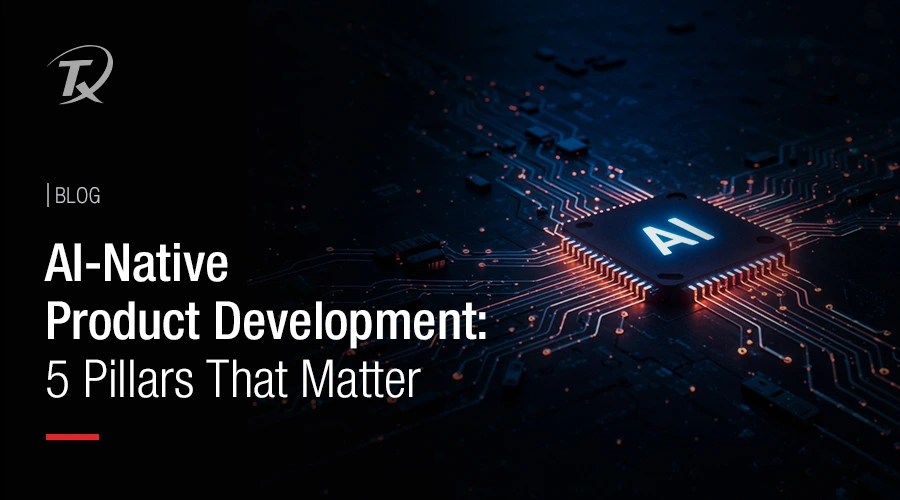Tx's Focus Areas
Agentic AI
QE with AI Automation
Agentic Governance
Agentic Compliance
Enhance Your Software Quality with AI-Driven Solutions
The power of AI is advancing rapidly, and organizations must adapt to remain competitive. At Tx, we combine innovative AI testing with human intelligence to ensure quality, speed, and accuracy. Our AI-powered solutions rapidly detect and predict defects, optimize test strategies, and provide real-time insights and fixes—empowering your teams to solely focus on innovation.
We harness the power of automation and AI to provide you with robust and data-driven results, with no room for error. Our bespoke AI solutions deliver a 5x faster time-to-market without sacrificing quality, empowering businesses with unmatched reliability, scalability, and user experiences. As AI adoption surges, staying ahead requires more than implementation—it demands continuous evolution. Our adaptive AI-driven approach ensures your business stays future-ready.

Partners That Trust Us





Our
AI-Powered Differentiators
 Test Smarter & Faster with our AI Accelerators
Test Smarter & Faster with our AI Accelerators
Our innovative accelerators like Next Gen Tx-Automate, Tx-GPT, Tx-HyperAutomate, Tx-Insights, and Tx-SmarTest accelerate processes, predict errors, and cover edge cases, delivering higher-quality software faster.
 Tx AI-Based Ecosystem
Tx AI-Based Ecosystem
Our proprietary AI/ML solutions continuously enhance our accelerators, seamlessly integrating Gen AI, Agentic AI, predictive analytics, and digital engineering intelligence to proactively identify and resolve bugs and performance issues.
 AI-Agents Optimized for Real-World Performance
AI-Agents Optimized for Real-World Performance
Our AI testing specialists provide essential human oversight, validating processes such as voice and NLP processing, text accuracy, API integrity, and conversation flow—ensuring AI agents do not just function, but think, respond, and engage intelligently.
Our Key Clients




Our AI-powered QE Services
Behind every breakthrough in software quality is a team of experts pushing boundaries. At Tx, our AI engineers and quality strategists work alongside the right AI-driven tools to improve testing coverage, predict and fix defects, and enhance accuracy.
Advanced QE with AI Automation

Tx's AI Automation for QE enhances application, data, and non-functional testing with AI-driven precision. Our AI-powered automation solutions like manual test case conversion, test case generation, self-regulatory systems for compliance, test artifact building, shift-left security, etc., leverage next-gen Agentic frameworks to provide release readiness, defect prediction, and test impact analysis for superior software quality.
Agentic AI Orchestration

With expert oversight, we offer tailored Agentic AI orchestration solutions, comprehensive management and automation of workflows using AI technologies, prioritizing performance optimization and incident management to address any issues promptly.
Agentic AI Governance Frameworks

Our Agentic AI Governance Frameworks ensure your systems operate within ethical and regulatory boundaries by detecting and mitigating biases and ensuring regulatory compliance through compliance audits, accessibility testing, and data privacy and security testing.
QE for AI, by AI
Our quality engineering approach blends the speed and accuracy of advanced AI with expert human validation. By combining scalability and accuracy, we deliver sustainable, high-impact quality engineering outcomes tailored for the next generation of intelligent applications.
AI Advisory

Our AI advisory services help businesses, questioning how to efficiently function in the ever-evolving AI landscape, adopt AI, up-skill teams, evaluate platforms to ensure their quality using Gen AI, Agentic AI, ML, DL, and CV apps.
AI-Enabled Data Quality

Harnessing the power of AI, we deliver intelligent data quality management and testing solutions that ensure data accuracy, integrity, and reliability. Our AI-driven approach accelerates validation processes, detects anomalies proactively, and refines data quality for business-critical insights.
Recent Insights
FAQ's
The best AI for testing depends on the use case. While Testim and Mabl excel in test automation, Applitools specializes in visual testing. AI-driven platforms with self-healing capabilities and intelligent test generation are ideal for improving software testing efficiency and accuracy.

 Everything to Review Before You Invest in AI-Led QA Transformation
Everything to Review Before You Invest in AI-Led QA Transformation 




See What Clients Are Saying About Us!
4.7/5.0
Overall Rating
"We got skilled QA professionals at a great value. Tx truly delivered quality without breaking the budget."
See All Reviews(CTO, Insurance Industry)
Get a Consultation